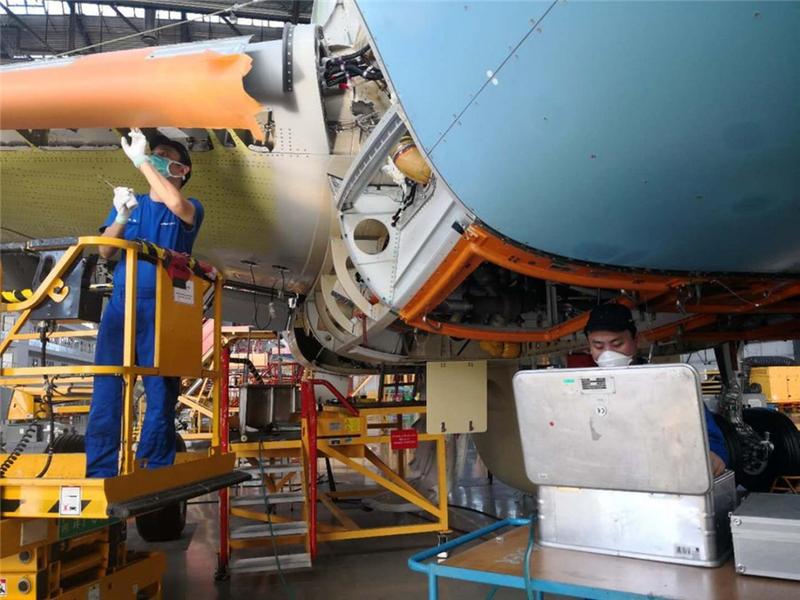 Staff at work at Airbus' Tianjin Final Assembly Line on Feb 17, 2020. (PHOTO PROVIDED TO CHINADAILY.COM.CN)
Staff at work at Airbus' Tianjin Final Assembly Line on Feb 17, 2020. (PHOTO PROVIDED TO CHINADAILY.COM.CN)
China's policymakers will strike a balance between containing the novel coronavirus pneumonia outbreak and facilitating the resumption of regular business activities as a prolonged economic standstill could trigger greater risks, economists said.
While it is still too early to make a full and final assessment of the contagion's impact on the Chinese economy, economists have been monitoring multiple daily activity indicators including traffic congestion, coal consumption and property sales to gauge the pace of business recovery.
Economists believe that China is capable of withstanding short-term shocks given the size and resilience of its economy and the immediate policy support to contain risks
Most economists believe that China is capable of withstanding short-term shocks given the size and resilience of its economy and the immediate policy support to contain risks. Some forecast a V-shaped or rapid rebound of growth around the second and third quarter as production resumes to normal levels.
ALSO READ: Foreign firms voice confidence in growth
While data suggests that the country's economic activities remain subdued, compared with the same period of last year, there have been positive signs in the economy such as robust steel production growth, improving property sales and more traffic, Wang Tao, chief China economist at UBS Investment Bank, said in a research note.
"We still expect a V-shaped rebound in Q2 to Q3 activities as pent-up consumer demand is released and production resumes to a normal level," Wang said.
It is widely expected that China will further loosen its monetary policy and accelerate government spending and infrastructure investment, especially in medical facilities and public health-related projects, to offset the negative impact of the epidemic.
The People's Bank of China is scheduled to announce the latest one-year and five-year benchmark lending rates on Thursday. It is expected that the central bank will cut the rates by at least 0.1 percentage point.
ALSO READ: PBOC cuts 1-yr MLF rate by 10 basis points to support economy
The expectation of more policy easing has fueled the recent stock market rally on the Chinese mainland. The benchmark Shanghai Composite Index has rebounded by nearly 9 percent since the first trading day after the extended Chinese New Year holiday to close at 2984.97 points on Tuesday.
Many economists have said that the most urgent task for the government is to shift its policy priority from using contingency measures to contain the disease to helping business activities recover, as the extended business shutdown will cause disruption to the supply chain and interrupt corporate cash flows.
"If economic activities are depressed by the disease control measures for too long, it is likely to have a substantial negative impact and trigger more risks to the economy," said Xu Gao, chief economist at BOC International.
Xu said it is necessary for the government to shift its policy focus to gradually resuming normal economic activities while fighting the contagion. The government also needs to start facilitating the orderly return of workers and to actively tackle the risks of a post-holiday migration peak that could potentially cause a second wave of infections, he added.
ALSO READ: Growth goal crucial amid outbreak
As the newly confirmed infection cases continue to decline on the Chinese mainland outside of Hubei province, the central government at several top-level meetings has stressed the importance of resuming business operations and industrial production, especially in less affected regions, while ensuring efforts to contain the spread of the disease.
READ MORE: Virus control, economy seen as priorities
The central government at several top-level meetings has stressed the importance of resuming business operations and industrial production, especially in less affected regions, while ensuring efforts to contain the spread of the disease
Such a proactive policy stance was reflected in General Secretary Xi Jinping's recent speech to the Standing Committee of the Political Bureau of the Communist Party of China Central Committee.
He said that the impact of the epidemic will continue, which will largely result in operating difficulties for smaller companies, delayed investment projects, depressed trade and commercial activities and rising pressure for the government to stabilize employment.
Therefore he highlighted several key tasks for the central government including facilitating the resumption of production, maintaining the overall stability of the supply chain, stabilizing household consumption and accelerating investment in new projects.
In addition to the existing measures such as liquidity injection, tax reduction and loan interest subsidies, economists expect China's fiscal policy to play an even bigger role, which will lead to greater government consumption and more infrastructure investment.
"We revise up our forecast for infrastructure FAI (fixed-asset investment) growth noticeably from 5 percent to 8 percent. In our view, infrastructure is still an important lever for the government to boost GDP when needed," economists at US investment bank Goldman Sachs wrote in a research note.
Xu at BOC International expects the government to tolerate a higher fiscal deficit ratio of above 3 percent of GDP this year. The government is unlikely to give up on achieving the goal of doubling 2010 GDP and per capita income by this year, he added.
Yan Se, chief economist at Founder Securities, said that the impact of the epidemic will vary from region to region so that monetary easing needs to be more targeted. Further reduction of banks' reserve requirement ratios by the central bank is possible.
"While the overall monetary policy may be constrained by inflation, we believe that a targeted easing policy to support small and micro businesses affected by the epidemic will be one of the priorities," Yan said.


